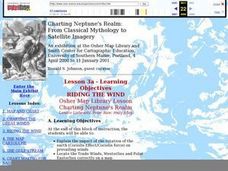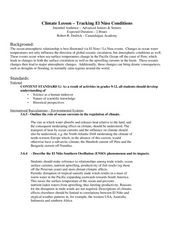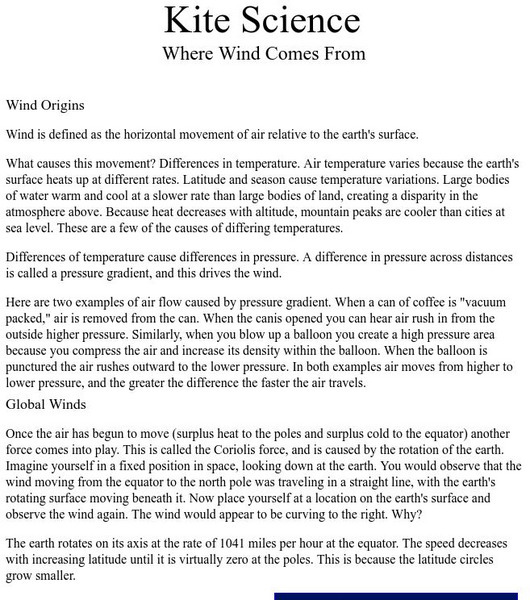National Energy Education Development Project
Introduction to Wind Energy
The U.S. produced enough wind energy in 2015 to power all of the homes in Alaska, California, Delaware, the District of Columbia, Hawaii, Idaho, Maine, Montana, Nebraska, New Hampshire, North Dakota, Rhode Island, South Dakota, and...
Curated OER
RIDING THE WIND
Students locate the Trade Winds, Westerlies and Polar Easterlies on a map, explain the impact of the rotation of the Earth, and plot a route for a round trip voyage from New York to London.
Curated OER
Movement of Air
In this air worksheet, students identify polar easterlies, prevailing westerlies, and trade winds on a Earth diagram. This worksheet has 13 fill in the blank questions.
Curated OER
Hurricane Strength: Spatial Association of Wind Speed and Water Temperature
In this hurricane worksheet, students read and analyze satellite images of hurricane Rita. They complete 4 short answer questions about it.
Curated OER
Measuring Wind Speed
Fourth graders measure wind speed over a week's time uisng a ping pong and a protractor and graph the results. They convert the number of degrees to miles per hour using a scale. They discuss patterns and relationships.
Curated OER
Follow Your Dreams: Career Goals
It is so important for impending high school graduates to start thinking about their potential careers. Here, they discuss the persistence of Blondie Hasler and his impressive transatlantic trip. They follow various routes on a map and...
Curated OER
Tracking El Nino Conditions
Students identify major changes in ocean temperatures during an El Nino season. In this climate lesson students complete an Internet assignment using datasets to determine periods of El Nino.
Curated OER
Weather Lesson
Students examine the various types of dangerous weather situations. In groups, they focus on the characteristics of a nor'easter and how it forms. They compare and contrast the two main types of nor'easters and examine how one can use...
Curated OER
Review For Weather Quiz 2
In this science worksheet, learners look at the information carefully in preparation for a formal assessment. The focus is upon defining different aspects of air masses.
Curated OER
Ocean Currents
Fourth graders work in groups to research ocean currents and create posters with their findings. They locate the patterns and names of major ocean currents and identify them on a map. Students also use red pencil to show ocean currents...
Other
Kites as Education: Wind Origins
This "kite science" site offers information on wind and the atmospheric conditions that cause it. From "Principles of Aeronautics."
NASA
El Nino: Making Sense of the Weather: Global Wind Patterns
This is an educational site offered by NASA that has information on global winds, including prevailing westerlies, with illustrations. Included is a short activity to illustrate the winds.
Weather Wiz Kids
Weather Wiz Kids: Wind
Wind is air in motion. It is produced by the uneven heating of the earth's surface by the sun. Since the earth's surface is made of various land and water formations, it absorbs the sun's radiation unevenly. Two factors are necessary to...
South Carolina Educational Television
Etv: Nasa Online: Light: Atmosphere
An interactive look at our atmosphere and factors which affect planet Earth. NASA measurements of volcanic eruptions, toxic emissions, aerosols, and wind patterns are all graphically displayed. Basic text plus bold visuals make this...
Ducksters
Ducksters: Earth Science for Kids: Weather: Wind
Kids learn about wind including how it is formed, how it is measured, local and global winds including prevailing, westerlies, trade, and polar easterlies.
NASA
Nasa: El Nino
A concise explanation of El Nino. Discusses global wind patterns and ocean temperatures. Offers interactive weather-related learning activities.
US Navy
Office of Naval Research: Oceans in Motion Currents
Use this site to learn what the Navy has to say about ocean currents and then test your knowledge with their quiz.
US Navy
Office of Naval Research: Ocean Currents
Probe the basics of ocean currents and be ready for the "quick quiz" upon completion of your reading. A concise and effective site supplemented with drawings.















